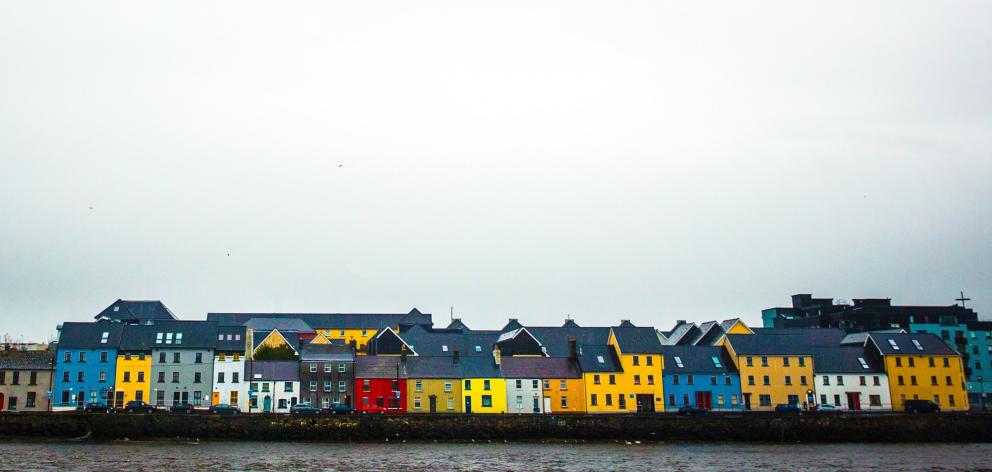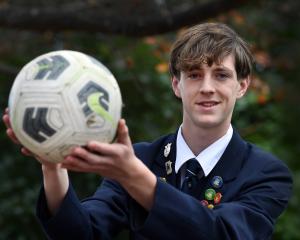
Dervla McTiernan loves nothing more than being at home writing with her cats, dogs, children and books.
‘‘I live a very quiet life. I’m not a terribly social person at home,’’ the best-selling Australian-based Irish author says.
But every so often as one of her books is published, she hits the road to publicise it - and this time she is coming to New Zealand and Dunedin.
‘‘Your publisher says, ‘now off you go, be very extrovert and go and have fun and meet lots of people’. And then when the two months are up, they’re like, ‘that’s enough of that now, back you go to your writing’.
‘‘Maybe it’s a good balance. I mean, it’s a little schizophrenic, but maybe it’s a good balance?’’
She remembers back around seven years to her first book, The Ruin, when she was lucky to get a handful of people to turn out to a book signing.
Six books later, including two standalone thrillers which each won the New York Times Best Thriller Award, crowds in the hundreds are turning up to her book events.
‘‘It’s just surreal, you know, and people are so nice to you. No human on Earth could deserve that level of niceness. So you’re just kind of trying to wrap your head around that.’’
McTiernan is quite modest, given The Ruin, the first in what has become her Cormac Reilly series, was a bestseller in Australia and in Ireland and named an Amazon book of the year in the United States, accolades that continued with its follow-ups The Scholar and The Good Turn. She has also won numerous awards, including two Barry Awards, a Davitt Award, a Ned Kelly Award and an International Thriller Writer Award.
It has not come easy, though. McTiernan practised law in Ireland for 12 years, believing writing was for other people. She had her own practice, which she set up when she was 26. But the 2008 global financial crisis hit her and her civil engineer husband’s work hard.
‘‘I had so many clients who lost everything down to family homes and we worked through the worst of the crisis, but it was incredibly stressful. And clients couldn’t afford to pay bills because they were losing everything.
‘‘We were going through our savings at the rate of knots. I was so burned out by it all. It was quite traumatic. You know, some really, truly terrible things happened in terms of suicides and things. And I just couldn’t do it any more.’’
They decided they wanted a fresh start, so looked at immigrating to Canada or Australia, going where the work was for him - with a 2-year-old and a baby on the way. Australia won out due to better visa options and her husband having backpacked there when younger.
Perth became home after her husband mentioned they had flying cockroaches in Brisbane.
‘‘And I said, ‘OK, perfect decision’. I was traumatised by the idea of cockroaches. It’s so stupid, but we don’t have them in Ireland. So I found them a bit horrifying at the time.’’
That was 14 years ago. Settling into a new life, McTiernan knew she did not want to go back to practising law when her children got a bit older, so she got a part-time job.
At the same time she began to write at nights at the kitchen table with the laundry stacked on one end, and the story of Maude and Jack emerged. She knew from the beginning it was going to be an Irish story.
‘‘And once I started writing, even though I was really bad to begin with, I’d have two hours in the evening to write and I could maybe get 500 words and they were terrible. And you delete the next day and start again. Even though I was that bad, it just felt so good. It felt so good. And I was like, this is the missing bit.’’
But she was living in Perth, adjusting to blue skies and the heat and missing Ireland.
‘‘In writing the books, I could travel home. So this is so stupid, but I used to close the blind and turn up the air conditioning - not very good for the environment - put on my jumper and genuinely play rain sounds. It’s so cheesy, I know, but that’s what I used to do to get in the mood. And then I was just there and it just felt like, ‘OK, I’m back in Ireland’.’’

McTiernan had no expectations. She was aware how hard it was to get published, let alone make a living out of writing, so her expectations were ‘‘non-existent’’, but she loved it.
‘‘And I still love it. And I think I’ll always love it. So as long as they let me do it, I’ll be doing it.’’
A turning point came when she entered a short story competition and was short-listed. It gave her the confidence to continue writing. She wiped what she had written on Maude and Jack and started again, trying to answer why this 15-year-old was having to look after her younger brother and living in poverty.
‘‘As I started to write it, it took the form of a kind of a police procedural type novel because it made sense. There’s a reason people write these books, you know, having a detective who follows an investigative path, it gives you a structure to build a book and a story around. And so the book kind of took on that structure. And then I understood it sort of instinctively.’’
At that stage she was not thinking about genres, and feels she has fallen into the crime-thriller genre by accident, due to her own passion for reading.
Her mother maintains she learned to read at 3 years old. As she was one of seven children, her mother did not have time to read to her, so instead encouraged her to read herself.
‘‘She was working fulltime trying to raise us all. So I would sit at her feet while she was ironing or peeling potatoes. I hate to fulfil the stereotype, but there you go. I knew my letters and she would sound them out for me. And that’s how I learned to read. And from that moment on, I never stopped. Books have been just my constant companion. I inhaled books.’’
Her passion in her teens and 20s was fantasy novels, but when she ran out of good authors she started to pick up crime novels.
‘‘I think I found the same sort of stakes and excitement and robust story between the covers of crime novels. So that’s what I loved. That’s what I was reading a lot.’’
So it was maybe no surprise the detective in that first book, Cormac Reilly, became the centre of the story and a series of books.
‘‘I never set out to write a series. That wasn’t my intention. It just grew. And so I wrote the first three books, which were The Ruin, The Scholar and The Good Turn. And I thought I might be done with series fiction at that point.’’
While people were keen for her to continue writing series fiction, she wanted to change things up. She went on to write two standalone novels. What Happened to Nina was No1 for five weeks in Australia.
But things changed one Sunday afternoon when she was lying on the couch reading a novel that was part of a series.
‘‘I was just like, really enjoying myself. And I was like, ‘I love this. I love being with these characters. They feel like old friends. I love being in this place that I know so well, but it also feels fresh to me. Like I’m genuinely excited. I don’t know what’s going to happen next.’ And I remembered just the charm of it for me as a reader. And it made me think, ‘geez, I really want to see if I can do this as a writer again and go back and write series fiction’.’’
Then the right story came along for the book, ‘‘so off I went’’, and her latest book The Unquiet Grave was born. She had been inspired by reading an article about ‘‘bog bodies’’, bodies discovered in Ireland’s peat bogs which have been preserved by the conditions of the bogs for centuries. But what really caught her imagination was the mysterious ritualistic injuries the bodies had.
‘‘So we don’t really know why this is done. The theory is that these bodies were Irish high kings who were sacrificed for a better harvest, because we had these little mini kingdoms in Ireland at that time in history. So I found all this fascinating and I was really interested. But, the dark crime writer’s mind takes over and I thought, ‘hmm, what would happen if we found a body? And at first glance, we thought this is another historical body. But almost as soon as you examine it, you go, oh, no, no, no. This happened much more recently’.’’

Then she wondered who would do that, why, and why would they kill someone in that specific way.
‘‘And then I had to write to answer that question.’’
Fans of the series will be happy to know that McTiernan believes she does have more Cormac Reilly books in her to write.
‘‘They’re just not up next, and I don’t know when I’ll get to it, to be honest.’’
McTiernan’s next novel is already at the publishers for its first edit, and she hopes to get stuck into that when she returns from the book tour; but if it’s not ready she will start her next one - a standalone story set in Melbourne, her first full-length Australian novel.
‘‘Because what I have learned is that I am happiest when I’m writing. I do get tired sometimes. And my husband will say ‘maybe you should take a break’. And then a week later, he’ll say, ‘I think the break’s over’. Because I just get so cranky. And so I don’t worry about the fact that I just like to work and I just get on with it, you know.’’
These days she has a little study upstairs out of the hustle of family life where she retreats to and writes, mostly keeping office hours. She spends the morning writing and then afternoon doing the surprising amount of administration that comes with the job.
McTiernan is looking forward to the rest of the year at home writing.
‘‘I won’t travel at all. It will just be at home with family every day, normal life, the normal rhythms and routine of life and writing every day. And it’s my favourite, favourite thing. So I’m really looking forward to it.’’
TO SEE
‘‘An Evening in Crime’’, Dervla McTiernan and New Zealand author Michael Bennett, Monday, May 12, 5.30pm, Beautiful Science Gallery, Tūhura Otago Museum.












